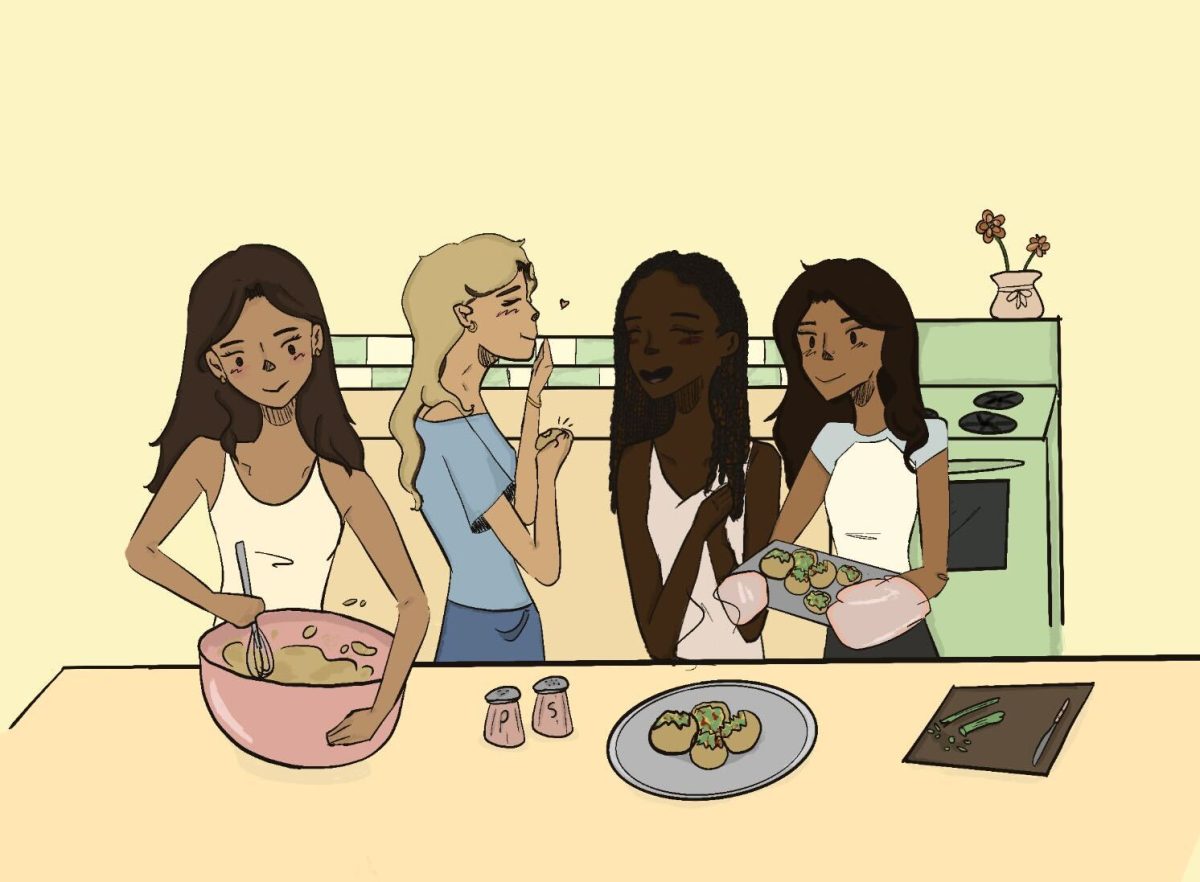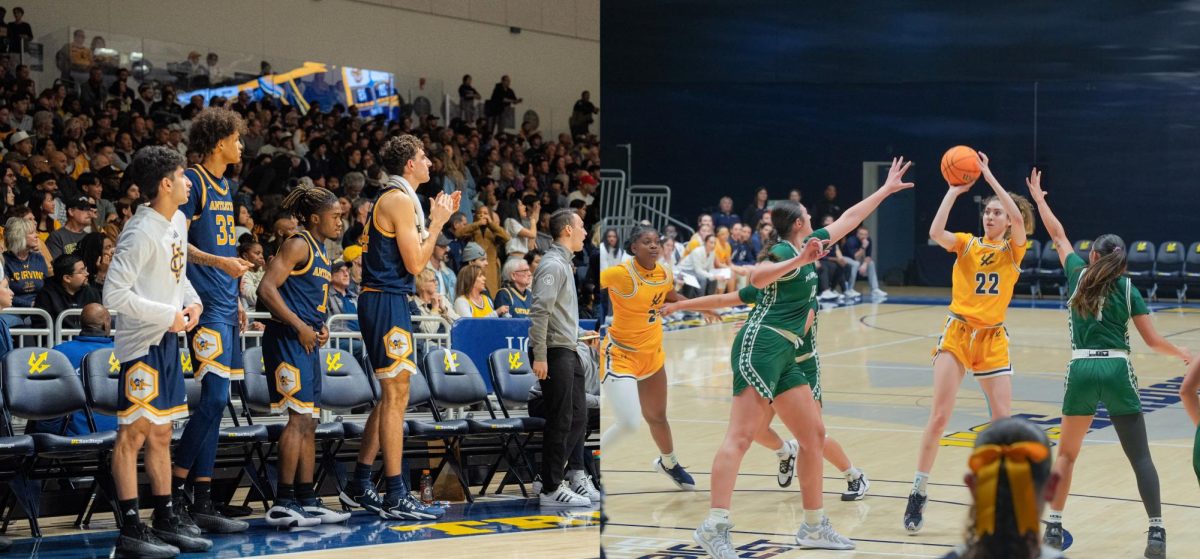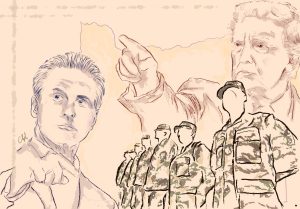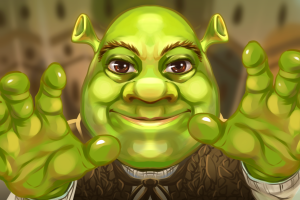Album Review: Girlpuppy’s “When I’m Alone”
girlpuppy’s debut album is riddled with self-loathing as she begins blinded by the relentlessness of love and slowly slips into its destructive aftermath without an identity, all while struggling with her greatest fear: being alone.
Apr 23, 2023
Girlpuppy, born Becca Harvey, left her bakery job to devote more time to her musical craft that she had been privately curating for years. Quarantine saddled her with time, and within a month she released her first single. “For You” is a dreamy indie-folk song that feels notably intimate like bedroom pop. On the strength of this single alone she picked up a stable fanbase, a record deal, and comparisons to Phoebe Bridgers. Coincidentally, Harvey’s current collaborators include Bridgers’s drummer — Marshall Vore — as well as Alex G’s guitarist, Sam Acchione. As the musical persona of girlpuppy solidified in both sound and style, Harvey welcomed the experiences of her collaborators and greatly strengthened her ideas and focus. Her debut album, “When I’m Alone,” bears Harvey’s markings of intimacy, but heavily centers on the acceptance that she is still unaware of who she is in the aftermath of intense relationships.
Sonically, the album exists between the spaces of indie folk and confessional singer-songwriter, which is a vehicle fitting for Harvey’s soft, airy voice. Drums are featured heavily on the album, courtesy of Vore, and serve to drive home the emotional weight that Harvey’s light vocals sometimes struggle to convey.
“Final Girl,” the album’s opener, is a purely instrumental track that sounds like a breeze moving lightly across drums and guitar strings. It’s a repeating movement; a slow, soft crescendo over and over. The title alludes to the final girl trope frequently seen in horror movies: the final girl left to face the killer, survive, and tell the story. Harvey sets the scene as the survivor of her story before she begins.
The first half of the album tackles the brutal and sickly nature of love that seems to infect Harvey rather than bring her joy. The lead single, “Wish,” is about Harvey’s inability to make peace with someone in her past as she sings: “I wish I lived in the walls of your apartment / I wish I could hear everything / I wish / I wish / I wish / I wish I knew everything.” The lyrics encapsulate desperation incredibly intimately — she seems to know it like the back of her hand. However, the instrumentation inflicts a feeling of desperation more intensely than her voice. While Harvey has the kind of voice that you could listen to for hours on end, sometimes it lacks depth. I find myself wanting more vocal expression — to feel exactly what she captures so deeply with her pen. But maybe it is part of her art: to leave notes of dissatisfaction for the listener to hold onto in the same way she’s been forced to. Harvey does not owe anyone catharsis, and how can she grant it when it is something she rarely attains for herself? The song captures the desperation that corrupts the mind after being unable to receive closure, leading to a desire to watch over someone and know their every moment. “Swallow” also captures this corruption, showcasing how love has the power to overtake one’s entire identity. Contrasted by an upbeat instrumental, Harvey sings: “the only time that I spend talking / is talking about you / worried that my whole existence / is swallowed up by you.” Harvey frequently shapes love to be a devastating and blinding force. She is entirely aware of the immense power it wields over her, but is unable to do anything except watch it course through her. Her fear of being alone, while never explicitly stated, is partly to blame for Harvey’s obsessive relationship with love. The reason that love demands and takes so much from her is that without it she doesn’t know who she is and doesn’t know what to put her emotions into. Without people to place her love into, her emotions spin and spiral into self-deprecation, as she claims in the title track “When I’m Alone.”
Harvey uses lyrical repetition frequently to encapsulate a variety of emotions: desperation, sorrow, aimlessness, desire, and more. “Wish” culminates with her singing, “I don’t even need an apology,” over and over. The following song, “Teenage Dream,” follows suit with the repetition of its outro “Leave me, leave me.” At the end of “Destroyer,” she sings the line “Be the destroyer” upwards of eight times after already singing the phrase several more times throughout the song. Artistically, it makes sense why she incorporates the repetition of specific messages. The repetition indicates the central idea and core emotion, which transforms alongside her as she continues to chant it. My criticism is the lack of emotion within her voice that takes these impactful lines brimming with feeling and almost renders them monotonous.
The second half of the album begins to aim externally, with songs dedicated to friends, family, and those who have hurt her. “Denver” is a bubbly ode to Harvey’s brother who she promises to always support and love. “Emma Marie” praises her friend whom she loves dearly, telling her everything that she would do for her because of how much she cares for her. “Emma Marie” stands as the weaker one of the two because of the song’s unmoving, soft tone throughout. “Revenant,” however, is a track aimed at someone who traumatized her in the past and how their actions have shaped her future, and it becomes one of the album’s highlights. Harvey promises that she’s doing better now that she has separated herself from the person who hurt her, but it is something that is impossible to entirely get over. She sings: “My throat closes up whenever I / see a Volkswagen.” The track shows girlpuppy at her finest, with breathy vocals, descriptive lyrics, and plain observations of her condition that feel incredibly raw.
The closing two tracks shift the focus inward, bluntly laying out Harvey’s fear of being alone that is danced around in every other part of the album. She grapples with trying to get people to stay in her life, even willing to be treated like a dog. This is best exemplified by the album’s penultimate titular song “When I’m Alone,” and by reassuring those around her that she can always change to be whatever they need, even if it means delaying self-understanding. Harvey insists that she is okay with forgoing the exploration of her identity for the sake of company, but what early-20-year-old is even sure of themself anyway?
Overall, “When I’m Alone” is a promising debut from girlpuppy that establishes parts of her style and lyricism while acknowledging that she has room to further solidify herself in the music industry. The album is mature and honest in its depictions of obsession, while simultaneously bright in its emphasis on loved ones. With time and willingness to grow, girlpuppy is an exciting talent to watch.
Released: October 2022
Grade: B
Image courtesy of Brooklyn Vegan

















